Education Service Center Region 12 staff, educators, mental health advocates and care providers will join forces for the 18th Annual Teen Suicide Prevention Symposium from 9 a.m. to 4 p.m., Thursday, June 15 at 2101 W. Loop 340 in Waco.
ESC Region 12 and Partners Cedar Crest Residential Treatment Center and Daybreak Health want to gather educators, mental health providers and community members to learn and take action to help save the lives of challenged youth. The event will encourage awareness, intervention and prevention of teen suicide, regarded as the ‘preventable epidemic’ among Texas youth.
“This year’s event focuses on issues and trends impacting youth in many ways that educators, parents and care providers are seeing in our schools. From speakers on Pediatric Acute Onset Neuropsychiatric Syndrome (or PANS), to discussions about the US Surgeon General’s Advisory on Social Media and its Effect on Youth Mental Health, we are presenting cutting-edge topics that have a direct impact on our teens and their mental health,” said Jenipher Janek, a counseling services coordinator and lead for the Region 12 School Crisis Response Team.
The ESC Region 12 School Crisis Response Team includes ESC counselors and communication staff, school counselors and mental health advisors from the Heart of Texas Behavioral Health Network. The group coordinates grief response and provides logistical and communications support, and crisis recovery at no cost to area schools. In the last year, the team has responded to 18 calls to support educators and students affected by the loss of a student, employee or other crisis incident impacting school operations, including loss of life to suicide. Part of this work includes connecting schools to mental health providers and creating awareness about TCHATT, the Texas Child Health Access Through Telemedicine, which provides telemedicine or telehealth programs to school districts to help identify and assess the behavioral health needs of students and provide access to mental health services.
Event partners, expecting 80 attendees, hope to bring in even more educators, mental health providers, police officers, counselors and emergency services personnel. Advance registration ($45) is requested at: txr12.escworks.net/catalog/session.aspx?session_id=297715. Schools in the Counseling Services Membership may send staff at no additional fee. For more on ESC Region 12 Counseling Services and School Support, visit bit.ly/2023ESC12.
Additional event supporters include the Central Texas Regional Advisory Council, Heart of Texas Behavioral Health Network, Heart of Texas Regional Advisory Council, Heart of Texas Suicide Prevention Coalition and VOICE.
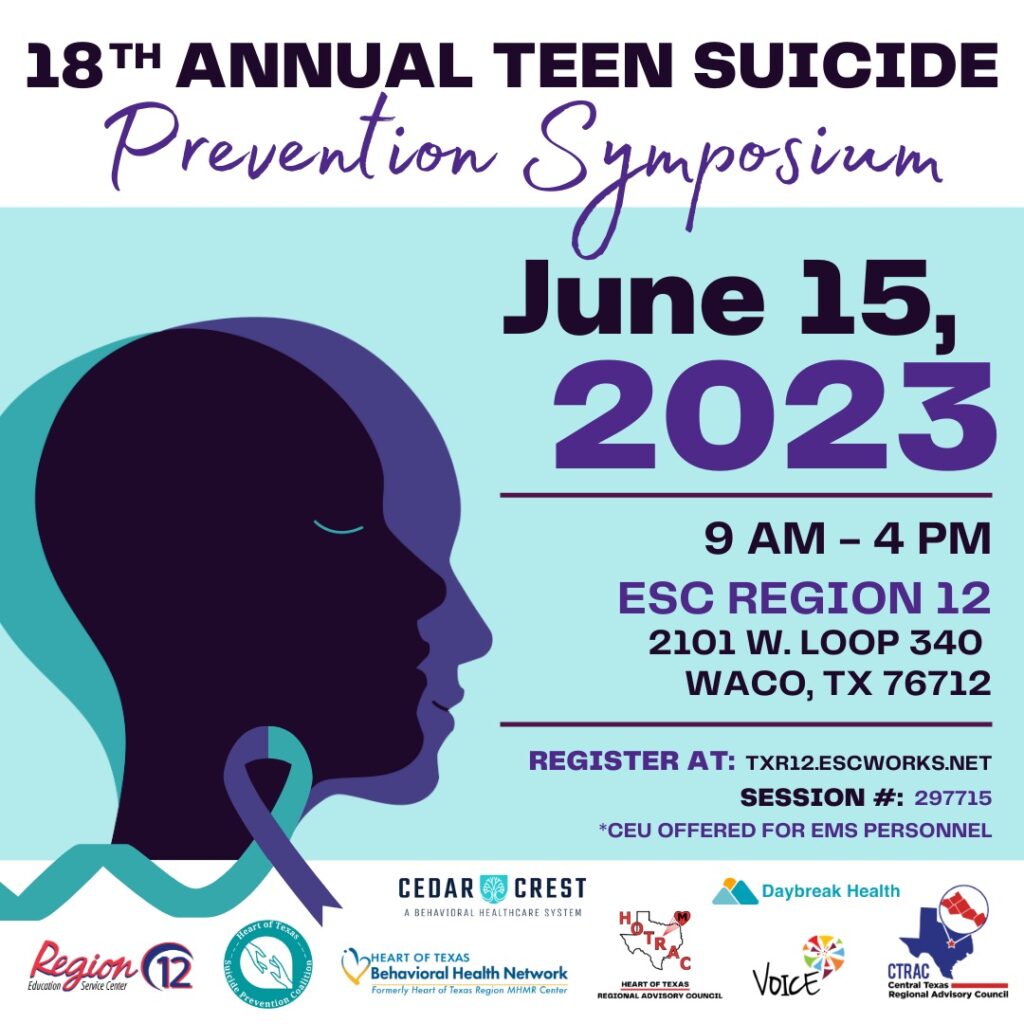
Big changes are coming for Medicaid recipients! People who are on Medicaid must take action now to preserve their benefits or find new health insurance.
Tory Schafer of Highview Insurance sat down with Meg Wallace of Mobilize Waco to explain these important changes. Meg asked Tory questions as though she were a Medicaid recipient who has been hearing about changes in Medicaid.
~~~~~~~~
Meg: I keep hearing about people getting a letter saying they need to renew their Medicaid. What is this all about?
Tory: Medicaid has income and asset limits. You have to stay within those limits to maintain eligibility in the program. The state periodically needs to review your finances to be sure you’re still eligible.
M. I’ve gotten a letter like this more than once in the past couple of years, and when I called Medicaid they said don’t worry about it. Has something changed?
T. Yes. During the pandemic millions of people lost their jobs in a short amount of time, and the government was concerned about people losing health insurance. So during the Covid Public Health Emergency, the government paused disenrollment in Medicaid. As long as the Covid Public Health Emergency lasted, people wouldn’t have to provide their financial information and recertify. They could stay on Medicaid without doing that.
The Covid Public Health Emergency is ending this spring, so Medicaid will start what is called redetermination. That means Medicaid will once again need to review your finances to see if you’re still eligible. They are starting this process now!
M. So I need to watch for this letter!
T. If you haven’t received a letter about your Medicaid recently, you need to make sure Health and Human Services has your correct address. At YourTexasBenefits.com you can see if they have your current address on file and update it if you need to.
M. OK, I’ll check on that. Then, when I get the letter about my Medicaid, what do I do next?
T. Follow the instructions in the letter to reapply for a new period of benefits. The letter should tell you what you need to submit and how to submit it.
But even if you don’t get a letter, if you receive Medicaid, you need to take care of this, and there are people in Waco who can help.
M. Oh, thank goodness, because this stuff gets confusing. Who can help me if I need help?
T. In the Waco area, Heart of Texas Goodwill and Shepherd’s Heart will have staff assigned to help people submit their information. Call Heart of Texas Goodwill at 254-753-7337 or Shepherd’s Heart at 254-213-7833.
M. Thank you. I’m writing that down now! This change is going to affect so many people. Should we be worried?
T. Yes, we should. If people don’t follow through with this process, they will lose their Medicaid benefits. So please spread the word. If you know anyone on Medicaid, let them know they must recertify this time around.
Many people will still qualify for Medicaid, but some people will find out they’re no longer eligible.
M. Yikes! Who might that happen to?
T. Four groups of people are likely to find out they’re no longer eligible.
First, adults who were briefly unemployed during the pandemic and began receiving Medicaid as a result may have income now, so they won’t be eligible for Medicaid anymore.
Second, women who received pregnancy Medicaid during the pandemic and have since given birth will no longer be eligible.
Third, young adults who were on children’s Medicaid at the start of the pandemic and who have since turned 19 are now too old for children’s Medicaid.
Fourth, children who were receiving children’s Medicaid during the pandemic because their parents’ income was lower, may become ineligible because their parents’ income is too high now.
M. Wow. That’s a lot of people. What can they do if they aren’t eligible for Medicaid anymore?
T. It depends. Some people will be eligible for other health insurance programs, and some will not. But many people don’t even try to get health insurance because they think it’s too expensive or they won’t be eligible. This is a big mistake.
If you’re eligible for employer-paid benefits, your first step is to talk to the person in charge of benefits where you work. Your special enrollment period may last only 60 days after you lose Medicaid.
If you can’t get affordable health insurance through your employer, there’s a good chance marketplace insurance will work for you. Right now, because of new federal funding, more people than ever before who have limited income are eligible for ACA insurance with premiums less than $20 per month, and with low or no deductibles or copays.
If you can’t get coverage in one of those two ways, there are also local options such as Indigent Health Care and the Waco Family Medicine Good Health Card.
M. I had no idea there were so many possibilities. Who can help me look at my options?
T. We’ve built a website called Unlock Healthcare, at www.unlockhealth.care, to provide information about these health insurance programs, along with contact information for local people who can help.
M. OK. So I think it’s going to be all right. I just need to follow through.
T. That’s right. There really are a lot of good options. But now is the time to take action.
~~~~~
Tory Schafer is the owner of Highview Insurance and the primary builder of Unlock Healthcare.
Meg Wallace is the organizer and director of Mobilize Waco, formerly known as the Amberley Collaborative. Mobilize Waco is a disability justice coalition that works toward full participation and leadership by people with disabilities in the Waco area.
Be Awesome Now and the Baylor Department of Wellness are partnering to sponsor the 2023 Fit & Well Expo 9 a.m.-2:30 p.m. Saturday, Feb. 11, at the SUB Barfield Drawing Room on the Baylor campus. The event will feature the following:

– Nutrition tips with Regina Mastin, Baylor Counseling;
– Fitness tips with Kelvin Robinson, HighPower Fitness;
– Pain-free training tips with John Weldon, D.P.T., Well Done Physical Therapy;
– Self-love tips with Emily Field, Refit Waco;
– Understanding “tripledemic” risks with Benjamin Ryan, Ph.D., Baylor Environmental Science;
– Wholeness & balance tips with Jon Singletary, Ph.D., Baylor School of Social Work; and
– Somatic yoga with Bianca Davis, East Meets West Training.
The Expo is free, and lunch will be included for the first 200 registrants. For more information and to register, click here.
By Rae Jefferson
Less than a year after publicly announcing plans to construct new headquarters, Waco Family Medicine broke ground Thursday, Oct. 20, on a new clinical site that will warmly welcome all people in the Heart of Texas regardless of income or insurance status.
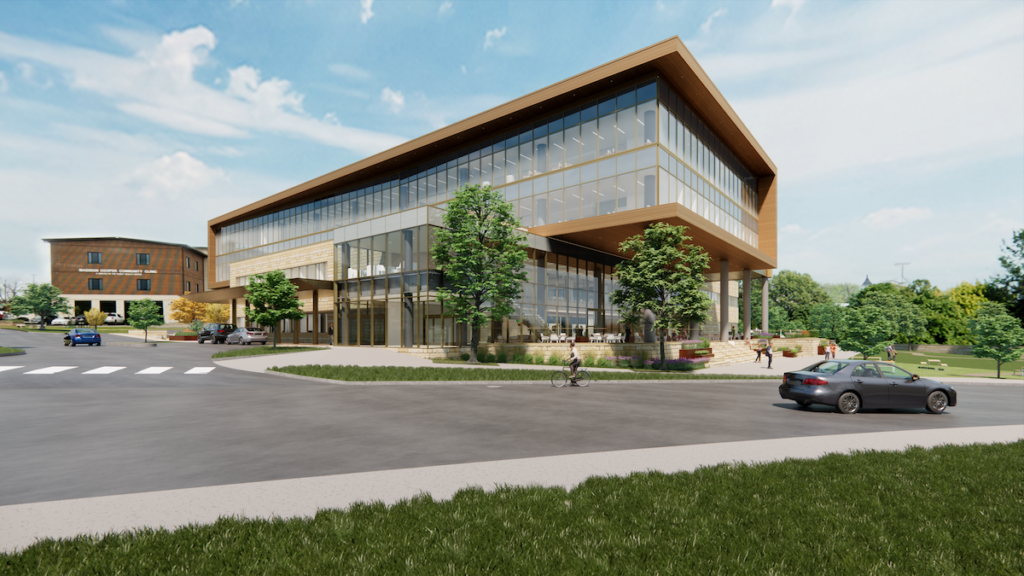
The clinic is at 1600 Providence Dr. Guests included WFM staff, local officials, community leaders, and enthusiastic benefactors who support accessible, high-quality healthcare in McLennan and Bell counties.
The speaker lineup included special guests Chip and Joanna Gaines, who are generous supporters of the campaign to fund the new site. They contributed to the project in honor of former WFM physician and faculty member Dr. Tim McCall and wife, Janice.
“Waco Family Medicine has been here to meet the needs of our community and the families here in Waco for over 50 years,” said Chip and Joanna Gaines. “We’re proud and grateful for the level of care and compassion the doctors and staff have offered and expressed during the past five decades. Thank you, Waco Family Medicine, and also a thanks to Tim and Janice McCall for all of their selfless work in serving Waco Family Medicine and, now, the children of Northern Uganda.”
More than 50 years ago, the residency program at WFM was born out of cross-sector collaboration. County officials, business leaders, and local medical providers sought to train new family physicians to alleviate a provider shortage and meet overwhelming medical need within the community. Today, the 15-site Community Health Center provides high-quality medical, dental, and mental health care to more than 60,000 patients each year. Additionally, the clinic’s family medicine residency program is in the top 2% of programs in the country, with hundreds of applicants vying for 12 openings each year.
“Multiple generations of local physicians and community members built Waco Family Medicine into an excellent center for primary care and a national academic family medicine leader,” said Dr. Jackson Griggs, CEO. “Building on that success, our new facility will inspire enduring generations of patients and health professionals and will anchor Waco Family Medicine’s efforts to achieve community thriving through whole-person, compassionate, comprehensive primary care.”
The new $61 million facility will further expand WFM’s capacity to care for patients, improve the healthcare team experience, and advance education and research in primary care. Construction will occur in phases to minimize disruptions to the adjacent WFM-Central location that the new building will eventually replace. Project completion is estimated for the summer of 2024.
Innovation is central to the blueprint of the coming site, with features like a state-of-the-art fitness center, teaching kitchen, and community garden intended to improve patient health in spaces other than an exam room. The first floor will also include a community marketplace with representatives from different social service agencies and nonprofits on site to assist patients with needs beyond healthcare.
“We are building this facility with a vision toward the future,” Griggs said. “In the decades to come, primary care will transform the American ‘sick care’ system into a true health care system, and Waco Family Medicine will be leading the way with interprofessional teams promoting wellness, integration of mental and oral health, and key services for non-medical drivers of health.”
Rae Jefferson is communications director at Waco Family Medicine, a Federally Qualified Health Center providing affordable, high-quality medical, dental, and behavioral health care in McLennan and Bell counties. She has a bachelor’s degree in Journalism and is pursuing her master’s in journalism, PR and new media at Baylor University.
By Deneece Ferrales
Feb. 7 is National Black HIV/AIDS Awareness Day. Uriah Robertson and the team at Waco-McLennan Public Health District who work in the clinic for HIV/AIDS services are preparing to use the occasion to raise HIV/AIDS awareness and encourage testing.“

Studies show that African Americans make up about 45 or 47 percent of new HIV diagnoses,” Robertson said. “Amongst women, we are seeing that African American women are 57 percent of new diagnoses. So, how do we decrease the numbers? We have to educate, advocate, encourage routine testing and so much more.”
As a risk reduction specialist, Robertson said his job is to “work with the community to provide intervention and prevention tools. We even perform HIV testing and encourage the importance of knowing your status.” Risk reduction specialists “have those conversations that others are afraid to have. We work to build rapport with our clients so we can get out into the clinic so that we can get the word out about our services while also working to break down the walls of stigma about HIV/AIDS.”
According to HIV.gov, a website managed by the U.S. Department of Health and Human Services, he first Black HIV/AIDS Awareness Day was held in 1999 as a grassroots opportunity to raise awareness in minority communities. In 2001, the day was given national status. This became needed as the number of new infections were disproportionately affecting people of color, particularly Black communities. At that point, new cases of HIV were escalating so quickly in the Black community that national leaders and the Centers for Disease Control began concerted efforts to combat the spread of HIV/AIDS in communities of color. According to the CDC, the history of these efforts includes:
- In 1998, the Congressional Black Caucus joined African American leaders from all over the U.S. to declare a “state of emergency” and created the Minority AIDS Initiative to offer funding for prevention efforts in Black communities. The CDC launched an array of prevention efforts aimed at preventing the spread of HIV among African Americans as a result of this funding.
- In 2000, HIV cases among Black and Latino men exceeded cases among White men, which was disproportionate to the general population, thus calling attention to health inequities surrounding the spread of HIV/AIDS.
- In 2007, the CDC launched its expanded HIV testing initiative to increase testing opportunities, primarily among African Americans.
- In 2008, the Black AIDS Institute reported that if Black America were its own country, it would rank 16th in the world in terms of number of people with HIV. It was estimated that 1 in 16 Black men would contract HIV/AIDS in their lifetime (approximately 6% of the population) and 1 in 32 Black women would contract HIV/AIDS in their lifetime.
- In 2010, the Obama Administration released first National HIV/AIDS strategy for the United States, which called on the nation to focus HIV prevention efforts on those at greatest risk, including African Americans.
Despite these efforts, sadly, this has not changed in the past 23 years. African Americans, more than any other race, have the highest rates of HIV infection in the nation. Black Americans account for approximately 14% of the U.S. population, but nearly half of those living and dying with HIV and AIDS are Black. Within this population, gay and bisexual men are the most affected, followed by heterosexual women. AIDS is the third leading cause of death among Black women aged 25–34 and 35– 44 and among Black men aged 35–44 (CDC).
Not only does this health inequity appear in the number of African Americans contracting HIV/AIDS, it also appears in the treatment of HIV/AIDS. Compared to all other persons with HIV, African Americans had the lowest rates of viral suppression. According to the CDC, out of every 100 Black persons living with HIV, only 63 are receiving some type of HIV care, 48 of 100 were retained in HIV care, and 51 of 100 were virally suppressed. This means that little more than half of all African Americans living with HIV received any type of treatment.
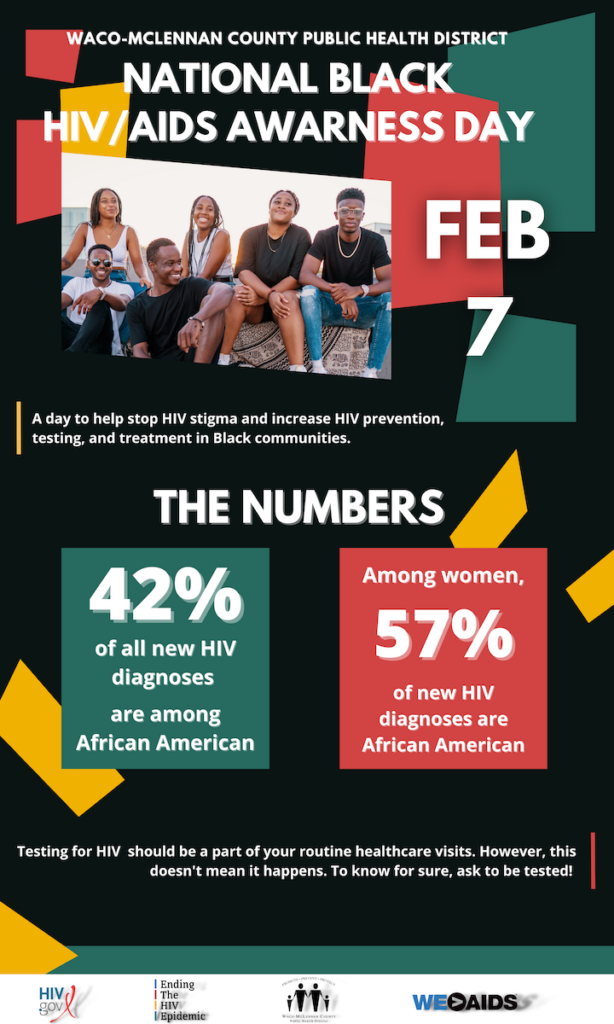
Though HIV is preventable, prevention remains the biggest challenge and further calls attention to the health inequities around this disease in Black communities. The challenges to prevention efforts include the stigma of a positive HIV status, people not having awareness of their HIV status, homophobia, racism, and mistrust of the healthcare system.
Lack of awareness of one’s HIV status can also lead to poor HIV treatment outcomes. Further, STI rates among African Americans are higher than among any other minority group, and there is a link between being diagnosed with other Sexually Transmitted Infections (STIs) and contracting HIV.
Lastly, persons experiencing poverty, which is higher in Black communities, are less likely to have access to quality healthcare for HIV, stable housing, and HIV prevention services.
So where do we start in addressing this health inequity? The most important place to begin is to encourage testing. If HIV is left untreated, chronic illness and death are the likely outcomes.
The first step to preventing this is for a person to know his or her status. Knowing one’s status can also prevent the further spread of HIV. Health professionals must continue to partner with Black community leaders to make outreach efforts aimed at more testing and increased awareness of prevention.
HIV treatment and prevention has come a long way in the past three decades. On Feb. 7, it is important to increase awareness of the continued need to address HIV prevention and treatment, particularly in Black communities. This is also a great day to encourage testing and the importance of knowing your status. Together, we can continue that fight to eradicate HIV/AIDS.

Deneece Ferrales, Ph.D., is director of health initiatives for Prosper Waco.
The Act Locally Waco blog publishes posts with a connection to these aspirations for Waco. If you are interested in writing for the Act Locally Waco Blog, please email the ALW team — [email protected].
Dec. 14 marks the one-year anniversary of the FDA’s authorization of COVID-19 vaccines for emergency use. For the first time since the pandemic began, the United States was able to have a proactive response to protecting people from the Corona virus.
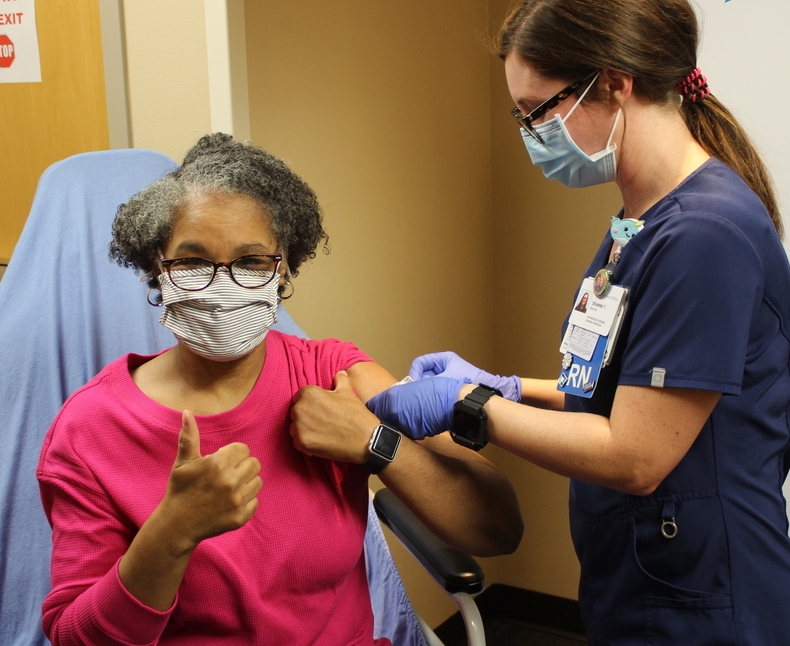
“This is a day to reflect on the marvel that it is that a year after the emergence of this new virus that vaccines could be developed, tested and deployed that are remarkably effective and safe,” said Dr. Farley Verner, health authority for Waco-McLennan County Public Health District. “And now over the year that these vaccines have been in use it is likely that over 200,000 deaths and untold numbers of hospitalizations have been prevented in the United States alone.”
The local public health district received the first shipment of 200 doses of the Moderna vaccine Dec. 23, 2020, and began vaccinating first responders. Since that time, the health district has administered 64,006 doses of vaccine through mass vaccination clinics, drive-through clinics, mobile clinics, and its main clinic.
Currently, 51% of McLennan County residents ages 5 and up are fully vaccinated.
The health district offers the Johnson & Johnson, Moderna, and Pfizer vaccines Monday through Friday at the main clinic (225 W. Waco Dr.) and at mobile clinics throughout McLennan County. You can find the schedule at www.covidwaco.com/.
The Act Locally Waco blog publishes posts with a connection to these aspirations for Waco. If you are interested in writing for the Act Locally Waco Blog, please email the ALW team — [email protected].
By Deneece Ferrales
One-quarter of Waco residents did not see a physician for any type of routine services in 2018, the last year for which such data is available. Data from the City Health Dashboard indicates many residents do not have a primary care physician or a “medical home.”
To help more Wacoans access care, Prosper Waco’s Access to Healthcare Working Group has planned an event, “Christmas on Memorial,” 4-7 p.m. Tuesday, Dec. 7, at the Family of Faith Worship Center, 4112 Memorial Dr. The event is a partnership between the church, McLennan County Indigent Health Care, and other organizations involved with the working group. (More details below.)
The lack of access to primary health care is particularly prevalent in certain Waco ZIP codes that include many lower income and Black and Hispanic residents. The problem not only puts residents at risk but also taxes the healthcare delivery system because the lack of regular healthcare often leads to undiagnosed problems that grow bigger. This leads to urgent care, including trips to the emergency room.
The following graph illustrates the percentage of Waco/ McLennan County residents who have seen a primary care physician within a year and the bullets underneath give the percentages for the most affected ZIP codes.
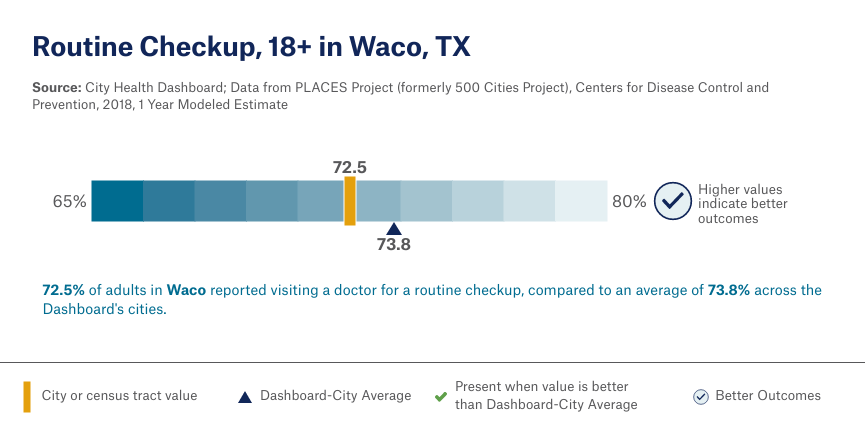
When broken down by ZIP code and census tract, the problem becomes more glaring.
- 76701, Track #1: only 66.6% of adults had a routine checkup in the past year
- 76705, Track #33: only 65.9% of adults had a routine checkup in the past year
- 76706, Track #2: only 66.5% of adults had a routine checkup in the past year
- 76798, Track #3: only 66.3% of adults had a routine checkup in the past year
Participants in “Christmas on Memorial” will have access to the following:
- Groceries for their families;
- Health screening from Ascension;
- Behavioral health screening from Heart of Texas Region MHMR,
- A COVID vaccine;
- Buy and wrap Christmas presents for kids at a reduced cost;
- Be entered into a drawing for prizes, including kids’ bicycles;
- Apply for health insurance and/or health benefits;
- Talk to a number of health agencies and providers about healthcare options and benefits; and
- A visit with Santa or play time in an on-site bounce house, along with an assortment of other kids’ activities.
The event is being held to help our community connect with healthcare resources. This event was planned by the Access to Healthcare Working Group, which is co-chaired by Heather Travers of McLennan County Indigent Healthcare and Deneece Ferrales of Prosper Waco.
For more information about this event or to sign up for a table at the event, please contact [email protected] or [email protected]. Flyers are available for distribution.
If you would like more information about the work of the Access to Healthcare Working Group, you please contact co-chairs Heather Travers or me at the emails above.
Deneece Ferrales, Ph.D., is director of health initiatives with Prosper Waco.
The Act Locally Waco blog publishes posts with a connection to these aspirations for Waco. If you are interested in writing for the Act Locally Waco Blog, please email Ferrell Foster.
The Waco-McLennan County Public Health District has partnered with area African American churches, the Waco NAACP, and VOICE to host a second “Shots for Souls” COVID-19 Vaccination Drive 1-4 p.m. Sunday, Nov. 14, at the Health District, 225 W. Waco Dr.
Participants can choose from the Pfizer, Moderna, or Johnson & Johnson vaccines. Adult vaccines, including boosters, and vaccines for children 5 years of age and older will be available. Lunch for the first 200 participants will be provided by the NAACP. Walk-ins are welcome and registration can be done on-line at covidwaco.com or at 254-750-5460.
“The holidays are fast approaching, and the health district is working with several organizations to get vaccines distributed just in time for the holidays,” said LaShonda Malrey-Horne, director of the health district. “The health district is collaborating with Waco NAACP, local Black churches, and VOICE Waco to offer vaccines to the East Waco community so families can enjoy the holiday season safely this year.”
Vaccination is the most effective way to slow the spread of disease and significantly decrease hospitalizations and fatalities due to COVID-19.
Waco-McLennan County Public Health District, Creative Waco, and City of Waco Parks and Recreation collaborated to create the Sidewalk Chart Art Obstacle Course Challenge. The Challenge was a community-wide project that tasked families to get outside and get creative by drawing their best sidewalk chalk obstacle course.

The Health District received multiple submissions from the community, all containing different, creative ways to get through the obstacle course such as: hopping like a bunny rabbit, spinning, doing your best touchdown dance, and jumping through lily pads like a frog.
“The goal for the challenge was to provide families with a fun way to get outside and get active, while also providing a COVID-safe activity for all to enjoy,” said Emily Green, public health education specialist for the Public Health District.
Families were asked to submit photos March 23-April 18, and winners were chosen May 3. A panel of judges representing local organizations scored the entries on creativity, obstacles within the course, and the ability for all community members to enjoy.
The winners are the Vaughn and Peebles families, the Sharma family, and the Striezel family.
The obstacle courses are now painted on sidewalks near the playground stations at Bledsoe-Miller Park (300 N. M.L.K. Jr. Blvd.), South Waco Park (2815 Speight Ave.), and Dewey Park (925 N. 9th St.). Tashita Bibles, a talented local artist, stayed true to the spirit of the kids’ original artwork, while bringing some magic of her own.
“How cool that some of the children who participated get to see their artwork come to life in City of Waco parks. It’s a reminder that everyone’s ideas can make a positive difference in our community” said Fiona Bond, executive director of Creative Waco.
Funding made possible through the Texas Healthy Communities, Texas Department of State Health Services grant.
The Act Locally Waco blog publishes posts with a connection to these aspirations for Waco. If you are interested in writing for the Act Locally Waco Blog, please email Ferrell Foster at [email protected].

